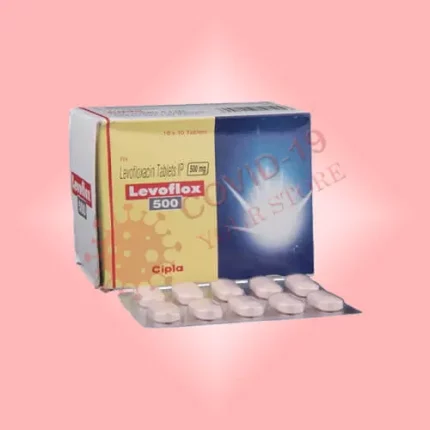What is Levofloxacin 250 mg?
Levofloxacin 250 mg is an antibiotic medication that belongs to the class of fluoroquinolones. It is used to treat a wide variety of bacterial infections, including respiratory infections, urinary tract infections (UTIs), skin infections, and other bacterial diseases. Levofloxacin is effective against both gram-positive and gram-negative bacteria, making it a broad-spectrum antibiotic that can be used to treat infections caused by various types of bacteria.
Levofloxacin works by inhibiting the action of two bacterial enzymes—DNA gyrase and topoisomerase IV—which are essential for bacterial DNA replication and cell division. By interfering with these processes, levofloxacin prevents bacteria from multiplying, leading to their death and helping the body clear the infection.
The 250 mg dosage is commonly prescribed for less severe infections or for patients who may need a lower dose of the medication.
How Does Levofloxacin 250 mg Work?
Levofloxacin 250 mg works by targeting and inhibiting bacterial enzymes that are crucial for DNA replication and repair. These enzymes, DNA gyrase and topoisomerase IV, are responsible for maintaining the structure and integrity of bacterial DNA. When these enzymes are blocked by levofloxacin, the bacteria are unable to replicate their DNA, which halts their growth and division. As a result, the bacteria die off, allowing the body’s immune system to eliminate the infection.
Levofloxacin is a bactericidal antibiotic, meaning it directly kills bacteria rather than merely inhibiting their growth. This makes it an effective treatment for a wide range of bacterial infections, including those that are more difficult to treat with other antibiotics.
Benefits of Levofloxacin 250 mg
- Broad-Spectrum Antibiotic: Levofloxacin 250 mg is effective against a wide variety of bacterial infections, making it a versatile treatment option for conditions such as respiratory infections, urinary tract infections, skin infections, and sinus infections.
- Effective Against Resistant Bacteria: Levofloxacin is often used to treat infections caused by bacteria that are resistant to other antibiotics. It can be particularly useful in cases where other medications have failed or when the bacteria are known to be resistant to common treatments.
- Fast-Acting: Levofloxacin is quickly absorbed into the bloodstream, allowing it to start working within hours of taking the medication. This makes it effective in treating both acute and chronic bacterial infections.
- Convenient Dosing: The 250 mg tablet of levofloxacin is typically taken once a day, making it easy for patients to follow the prescribed treatment regimen. The medication is available in both oral and intravenous forms, providing flexibility in treatment options.
- Low Risk of Severe Side Effects: Levofloxacin is generally well-tolerated, and when taken as prescribed, the risk of severe side effects is low. This makes it a safe option for most patients, especially when used for short-term treatment.
How to Take Levofloxacin 250 mg
Levofloxacin 250 mg should be taken exactly as prescribed by your healthcare provider. The dosage and duration of treatment will vary depending on the type of infection and the severity of the condition. Here are some general guidelines for taking levofloxacin:
- Dosage: The typical dose for Levofloxacin 250 mg is one tablet per day, depending on the type of infection. Your healthcare provider will determine the appropriate dosage for your specific condition.
- Administration: Take the tablet with a full glass of water. Levofloxacin can be taken with or without food, but it is important to avoid taking it with dairy products (such as milk or yogurt) or calcium-fortified juices, as these can interfere with the absorption of the medication.
- Missed Dose: If you miss a dose of levofloxacin, take it as soon as you remember, unless it is almost time for your next dose. Do not take two doses at once to make up for a missed dose.
- Complete the Course: It is important to finish the entire prescribed course of levofloxacin, even if you start feeling better before the medication is finished. Stopping the medication early can lead to the return of the infection and may contribute to antibiotic resistance.
- Hydration: Drink plenty of fluids while taking levofloxacin to help prevent the formation of crystals in the urine, which can cause kidney problems.
Who Makes Levofloxacin 250 mg?
Levofloxacin 250 mg is manufactured by several pharmaceutical companies, including Sandoz, Teva Pharmaceuticals, Cipla, and Mylan, among others. The drug is available in both brand-name and generic forms, with generic versions offering a more affordable option while maintaining the same effectiveness.
Levofloxacin is also available in intravenous (IV) form for patients who are hospitalized or unable to take oral medications.
Is Levofloxacin 250 mg Safe for Humans?
Levofloxacin 250 mg is generally considered safe for most people when used as directed. However, like all medications, it can cause side effects, and it may not be suitable for everyone. It is important to consult with your healthcare provider before starting treatment with levofloxacin, especially if you have any of the following conditions:
- Kidney disease: Levofloxacin is primarily excreted through the kidneys, so individuals with kidney problems may require a lower dose or more frequent monitoring.
- Seizure disorders: Levofloxacin may increase the risk of seizures in people with a history of seizure disorders.
- Tendon problems: Fluoroquinolones like levofloxacin have been associated with an increased risk of tendonitis and tendon rupture, especially in older adults or those taking corticosteroids.
- Allergic reactions: If you are allergic to levofloxacin or any other fluoroquinolone antibiotics, you should not take this medication.
Side Effects of Levofloxacin 250 mg
While levofloxacin is generally well-tolerated, some people may experience side effects. Common side effects include:
- Nausea or vomiting
- Diarrhea
- Headache
- Dizziness
- Insomnia
Serious side effects are rare but can include:
- Tendonitis or tendon rupture
- Severe allergic reactions (rash, swelling, difficulty breathing)
- Heart rhythm problems (QT prolongation)
- Liver damage (yellowing of the skin or eyes)
- Seizures
If you experience any of these serious side effects, stop taking levofloxacin immediately and contact your healthcare provider.
Disclaimer
This content is for informational purposes only and should not be considered as medical advice. Always consult your healthcare provider before starting any new medication, including Levofloxacin 250 mg. The information provided here is not a substitute for professional medical guidance, diagnosis, or treatment.





